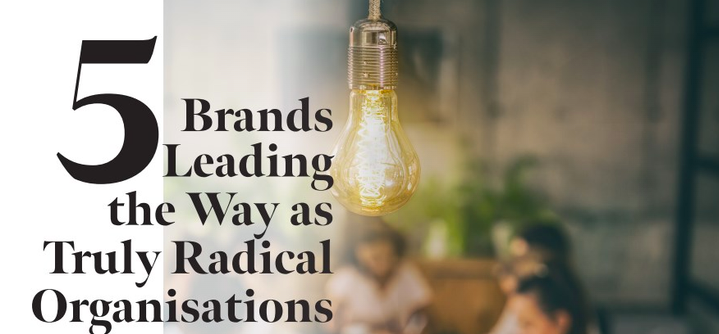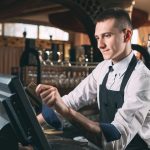The world is smarter today. With instant information at our fingertips, we can quickly sniff out organisations over-promising and under-delivering. Converging crises mean that leading organisations can no longer rest on their past reputations because their stakeholders are increasingly pushing for more responsible business practices, from defining why they’re here to overhauling their own internal structures, capital investments, ecosystem partner criteria, and operating processes. That’s why this new definition of a brand is vital to understand and embrace. Here are five organisations leading the way. These are not the typical organisations featured in popular brand surveys, which already get enough exposure. These are lesser-known, emerging organisations making demonstrable progress using radical business practices to develop their brand reputation.
Doconomy and Alandsbanken
There is a 100-year age difference between these two companies. Alandsbanken, from Finland, was started in 1919 and Doconomy, from Sweden, was founded in 2018. Yet they have a shared interest in fostering societal value by encouraging us to reduce our carbon footprint.
Alandsbanken was founded by farmers and sea captains who exuded a ‘can do’ attitude. Their authentic story stands in contrast to the slick corporate marketing of bigger financial players that too often trot out the same soulless blather disguised as ‘feel good’ customer care. Alandsbanken’s values include a focus on long-term sustainability in financial and ESG areas. A financial focus is understandable since they are a bank. Yet by pursuing ESG practices Alandsbanken is also signalling to stakeholders that having a societal impact beyond typical banking is vital to their aspirations.[i]
Doconomy aims to future proof life on earth. Using the theme ‘Everyday Climate Action’ the company demonstrates care for the environment through a suite of digital tools that tell consumers the carbon footprint impact of their purchases,[ii] in essence educating the public about using money as a force for good.
The two companies collaborated to create the Aland Index, which measures CO2 emissions arising from transactions. Using special credit cards and ecosystem partners the itemised carbon impact metrics generated by purchases increases consumer awareness about shifting their spending from high carbon to low carbon purchases.
Givingway
Givingway, founded in 2015 and based in Israel, started in voluntourism, an approach to travel that helps travellers give back to the places they visit. They enlisted the support of more than 7,500 nonprofits in 144 countries and have grown rapidly, evolving their services along the way. Givingway is now a platform with a mobile app that helps travellers and nonprofits manage their voluntourism and fundraising needs.[iii] Their model exemplifies how to create impactful, immersive experiences for stakeholders that help communities in emerging markets. Their unique mission combined with advances in digital technology have the potential to create a super app that benefits travellers, communities in need, and nonprofits through its combination of partners, locations, volunteer management, and fundraising.
Vancity
Vancity is a Canadian credit union with a reputation as a values-based bank that genuinely cares about the people in the communities it serves. They are pushing ahead on multiple fronts to directly address the key challenges of our time. The pandemic led to lost jobs and sharp declines in small business revenues, plus the climate crisis and continued racism have exacerbated social tensions and anxiety. During the height of the pandemic, Vancity[iv] offered zero interest working capital loans for small businesses; reduced credit card rates to zero and waived ATM fees for individual customers; bought back foreign currencies at full value from customers whose trips were cancelled; raised $8 million to support local groups helping to reduce homelessness; and created a Unity Term Deposit to support people directly impacted by COVID-19, raising $200 million in 30 days.[v] Vancity also analyses and discloses the greenhouse gas emissions related to loans and investments it finances; gives financial services to disadvantaged people who are outside the banking system; and is committed to DEI, aiming to have 40% of its leadership team comprised of LGBTQ, indigenous, people of colour, and people with disabilities.[vi]
Bridge Institute
Bridge Institute is an organisation that works with an ecosystem of partners from business, government, and non-profits to build peaceful and inclusive communities by helping solve intractable problems (violence in societies, solutions for COVID-19, sexual assault, the UN’s 17 Sustainable Development Goals…). It provides tools to help people close social gaps and work collaboratively.[vii] They exemplify how to bring together organisations with divergent backgrounds and competing interests to create meaningful societal value. Their work is exceedingly difficult. As an example, they were asked to help in a country where social conflict and ongoing strife created deep animosity among different groups. In one of the groups was a young person whose father was killed during an uprising. He sought to avenge his father’s death through violent retribution. Bridge Institute was able to get the parties to openly discuss their tensions, focusing on the social beliefs and political factors that encouraged a culture of violence. The process took time, but the parties were committed to finding a resolution. As they gained familiarity, they were increasingly open to the benefits of adopting a non-violent, peace-building mindset, ultimately easing tension between the groups. The young man is now an advocate for peace and non-violence.
Skånetrafiken
Sweden’s Skånetrafiken is a regional public transportation authority that is radically altering public transportation services that is also leading to demonstrated social benefits. It is an amalgam of different government agencies and local transport firms in the country’s Region Skåne that are working together to become 100% climate-neutral and completely reinvent the urban-travel experience on public buses and trains for its citizens. Buses have reduced their climate emissions by 90% by running on renewable fuels or electricity, closing in on their 100% target. Eco-friendly materials are built into each bus. Nearly 470,000 daily bus trips are made on 14,000 routes, totalling 170 million each year. The carefully planned locations of bus stops in urban residential areas combined with clever public service messages has significantly increased public transportation usage and correspondingly reduced people’s dependence on cars, a vital change since one car emits the same amount of greenhouse gas as 243 train trips, or 107 bus trips. One bus can transport 64 passengers, equivalent to approximately 49 cars. People are walking more to get to the bus stops, too, supporting personal health and well-being. [viii] The increased use of Skånetrafiken’s public transportation and easily accessible public stations is encouraging people to travel to different parts of the region, expanding their appreciation for and understanding of other communities.[ix]
Each of these organisations is using new approaches to create societal good as experienced by their stakeholders. They are not repackaging the same old thing for a new year. They are radical brands that are making a positive impact, offering compelling lessons from which we can all learn and benefit.
About the Author
John A Davis is an award-winning academic, business leader and author of Radical Business: How to Transform Your Organization in the Age of Global Crisis published by Emerald.
[i] No author. (2021). Alandsbanken website: https://www.alandsbanken.com/. [ii] No author. (2021). Doconomy website: https://doconomy.com/ . [iii] Source: https://www.givingway.com/ [iv] Source: https://www.vancitycommunityfoundation.ca/COVID19 [v] Source: https://www.vancity.com/Investments/TypesofInvestments/TermDeposits/NonRedeemableDeposits/UnityTermDeposit/ [vi] Source: https://finance.yahoo.com/news/vancity-2021-building-clean-fair-130530885.html [vii] Based on 2021 author Interviews with Mac McKenzie. [viii] Source: https://www-skanetrafiken-se.translate.goog/om-oss/miljo/?_x_tr_sl=sv&_x_tr_tl=en&_x_tr_hl=en&_x_tr_pto=sc [ix] Source: https://www.mckinsey.com/business-functions/operations/our-insights/the-expanding-role-of-design-in-creating-an-end-to-end-customer-experience













